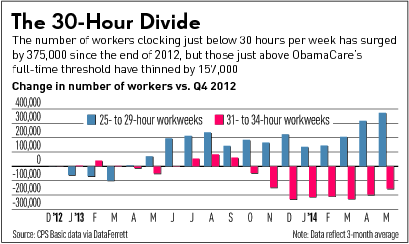June 23, 2014
ObamaCare Employer Mandate Hit-List Grows To 429
By JED GRAHAM
INVESTOR'S BUSINESS DAILY

The hits keep on coming — to the work hours of special education aides,
school bus drivers, cafeteria workers, custodians, home-care workers, adjunct
faculty and college students.
With this week's addition of 28 documented examples of employers cutting work
hours to dodge fines levied under ObamaCare's employer insurance mandate, IBD's
list now includes 429 employers.
(The ObamaCare Employer Mandate List, substantiated with links to news
sources and public documents, is available for downloading at
Investors.com.)
Among the new additions are seven school districts, bringing the total to 130
districts where hours have been cut or permanent staff outsourced to avoid
taking on new costs for employees who work at least 30 hours a week — considered
full time under ObamaCare.
In May, Oklahoma's Sweetwater County School District #1 said it would cut
hours for more than 250 part-time and substitute employees to avoid as much as
$2.7 million a year in added health insurance costs.
This month, the small Cass City Public Schools system in rural Michigan cut
hours for 20 bus drivers and paraprofessionals to avoid up to $120,000 in extra
insurance costs. One proposed way of coping with fewer transit hours: providing
only one-way bus service for coaches and teams traveling to athletic events.
In February, Indiana's South Madison Community Schools cut hours for 130 bus
drivers, cafeteria workers, instructional aides and custodians to avoid up to
$1.2 million in insurance costs .
Other new additions involve cuts to the hours of college students, adjunct
faculty or both at Kansas University, Mississippi State University, the
Technical College System of Georgia, Colorado Mountain College and South Dakota
State University.
IBD's list of ObamaCare job and hours cuts is dominated by public-sector
employers, but that undoubtedly reflects their relative transparency about work
policies, some of which come up for votes before school boards or county
commissions.
Bureau of Labor Statistics data show that the workweek has also been
depressed for modest-wage workers in the private sector, and the evidence points
to ObamaCare's mandate as an important factor.
One way to test for an ObamaCare effect on the workweek — suggested by White
House economists, no less — is to look at whether there is a shift in the ratio
of workers clocking 31 to 34 hours per week compared to those working 25 to 29
hours.
If that ratio were stable or rising, it would be a sign that ObamaCare wasn't
affecting work hours in a meaningful way, the White House has suggested. But the
data signal the opposite: The ratio has plunged to the lowest level in almost 14
years.
Growing Shorter Weeks
The number of workers usually clocking 31 to 34 hours in their primary job
has shrunk by 157,000, or 6.4%, since the fourth quarter of 2012. Meanwhile, the
number of 25- to 29-hour workers has surged by 375,000, or 10.8%.
These Current Population Survey data tell a story similar to the BLS industry
data. In private industries where pay averages up to about $14.50 an hour,
nonsupervisors clocked, on average, just below 27.5 hours per week in April —
right near the record-short workweek set last July as the employer mandate was
delayed until 2015. (Readings over the stormy winter plumbed new depths, but
didn't signal much.) Early this year, the Obama administration kicked the can
another year for firms with fewer than 100 full-time-equivalent workers.
IBD's Employer Mandate List also helps connect the dots between the depressed
low-wage workweek and ObamaCare.
Entire Industry Cuts Hours
Consider, for example, the industry that provides in-home care to the elderly
and disabled. BLS data show that the average workweek in this sector shrank from
28 hours at the start of 2013 to 26.9 hours in April.
IBD's list now includes five such companies with the addition of a Home
Instead Senior Care franchise, which is cutting hours for 30 to 40 workers.
Sen. John Thune, R-S.D., and Rep. Luke Messer, R-Ind., have both proposed
bills that would exempt public school districts and colleges from the employer
mandate.
IBD hasn't added to the list school districts where only substitute teachers
are affected, or else the list could have hundreds of more entries, since that
has become so commonplace.
While modest-wage workers are feeling the brunt of the mandate in the form of
lost work hours, the University of South Carolina opted to protect its workers —
but at the cost of its students.
Rather than cutting work hours for its adjunct faculty, the university said
that an extra $4.5 million in costs due to ObamaCare will lead to a bigger
tuition hike than otherwise.